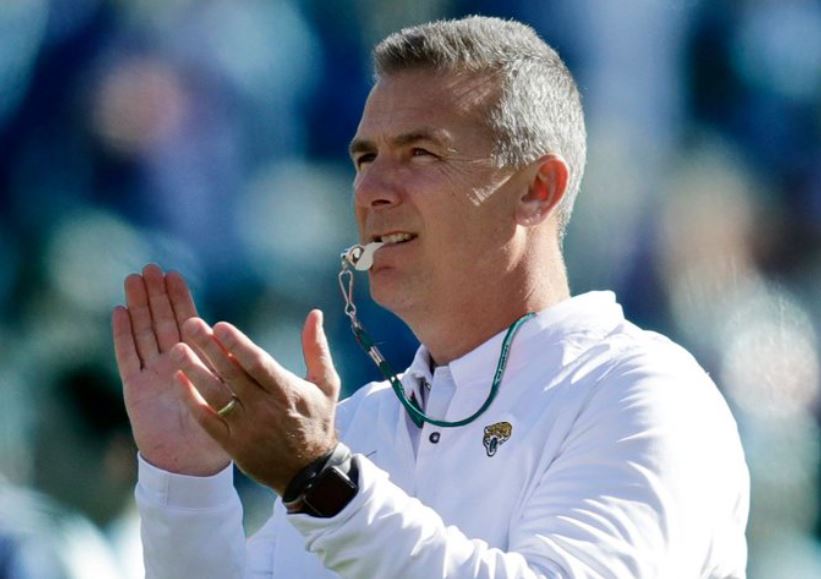

Taylor Spivey, a 2014 Cal Poly graduate, was a standout swimming athlete for the team. She etched her name in history last year when she competed for Team USA in the Paris Games’ women’s triathlon. So, at Cal Poly, many athletes were dreaming of following in her footsteps and competing at the highest level. However, quite recently, when Cal Poly announced that they were discontinuing their swimming and diving program, the news was a jolt for these athletes. Now, Urban Meyer has expressed a similar concern about his two daughters’ sports future, questioning the broader future of Olympic and non-revenue sports in college athletics.
Watch What’s Trending Now!
Cal Poly’s discontinuation of the swimming and diving program came as the House v NCAA was approved by Judge Claudia Wilken. While several things like payments to athletes may seem positive, the disproportionality it brings will affect the sports that do not generate revenue. Cal Poly’s President Jeffrey D. Armstrong cited a similar reasoning and difficulty in sustaining the program. “The House vs. NCAA settlement, which addresses past and future compensation for student athletes related to name, image, and likeness (NIL) rights, will have a significant financial impact — resulting in a loss of at least $450,000 per year for our programs.” So, what will the college athletic landscape look like?
ADVERTISEMENT
As per the proposed revenue allocation, programs will have $20.5 million to distribute to their athletes. While this may seem good, almost 75% of this revenue will go to football, which generates the highest revenue, and 15% is speculated to go towards basketball. Other sports like baseball, lacrosse, and swimming etc, will be an afterthought, getting just 5% of the revenue share. And for female athletes, the money would be far less. For context, a female swimming athlete could get as low as $125 in revenue sharing money, while a top football player will earn at least 6 figures, excluding NIL money. This growing imbalance concerns Urban Meyer, and he is worried for his two daughters.
Meyer, who is a regular co-host on ‘The Triple Option’ podcast, showed concern about the disparity and programs scrapping less profitable programs on the June 11th Episode. “I just hope women’s sports don’t go away. Olympic sports are in danger, man. Both my girls played college sports, and you take away college volleyball from my daughters, that’s a game changer.” Later, the former Ohio State head coach even pointed to Michigan and said how Warde Manuel pointed to “significant shortfall” because of the challenges brought by the NCAA settlement.
ADVERTISEMENT
View this post on Instagram
Urban Meyer has two daughters: the eldest one, Nicki Meyer, who played volleyball at Georgia Tech, and the other one being Gigi Meyer. Gigi also played volleyball at Florida Gulf Coast University. While his daughters may have graduated from college, Urban Meyer’s concern is not limited to his daughters. But seeing the sport fade into oblivion in front of him, which other female athletes aspired to play is disheartening. The House v. NCAA has truly brought in a slippery slope, and let’s see how colleges manage lesser-watched sports. As for the Michigan thing Urban Meyer pointed out, it’s quite grim!
ADVERTISEMENT
Is Michigan in a big rut, as Urban Meyer’s premonition is coming true?
Michigan is probably one of the richest programs in America in terms of athletic revenue generation. Even Urban Meyer pointed out and said, “one of the most lucrative athletic departments in the country.” But despite that, Michigan is facing a significant revenue deficit as their Athletic Director, Warde Manuel, also pointed out in a long statement he released after the House settlement was finalized.
ADVERTISEMENT
The letter stated that Michigan was facing more than $27 million in deficit for the financial year 2025-2026. This deficit stemmed from the $20.5 million in revenue sharing and the $6.2 million for the new scholarships. Moreover, the AD also pointed out that Michigan was having a $19.1 million revenue shortfall, “from having just six home football games.” To counter that, the AD also projected some measures that the program will take.
This includes reducing staff retention by 10% every year and implementing a strict process for new hires. Moreover, Manuel also announced $10 million in budget cuts and reduced the TV revenue allocated to the University to $2 million from $8 million earlier. In order to boost revenue, measures like selling alcohol in stadiums, organizing soccer and NHL games are being implemented. The verdict?
ADVERTISEMENT
The verdict is clear: even powerful programs like Michigan are facing the brunt of the House v NCAA settlement, and it may take some time to smoothly navigate that. As for Urban Meyer’s concern? It’s quite real, and we still need some clarity over Title IX concerns.
ADVERTISEMENT
ADVERTISEMENT
ADVERTISEMENT
ADVERTISEMENT
.png)
.png)
.png)



